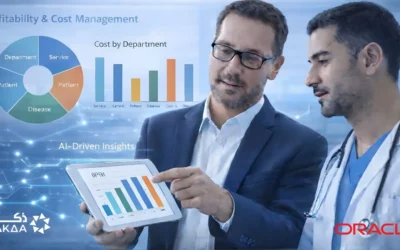As the biggest global pandemic in over 100 years, the COVID-19 crisis is having a major impact on the global economy and organizations in almost every industry across the globe.
And while the worst of the outbreak is hopefully behind us, the return to normalcy and the timeline for economic recovery is anything but certain.
“Given the nature of the crisis, all hands should be on deck, all available tools should be used.
We are providing support, as attractively as we can, so that from the household to the large big corporate account, all economic players can access financing through their banks” – Christine Lagarde, President – European Central Bank.
COVID-19 pandemic is a true “black swan” event that has disrupted the global economy in ways that were never envisioned.
As the Dresner Advisory research insight reveals, having modern Enterprise Performance Management (EPM) software in place is crucial for organizations to closely monitor their business. In addition, it enables them to run daily and weekly forecasts of revenue and cash flow, as well as to model multiple recovery scenarios. As a result, they can support agile decision-making in uncertain times.
BI Business Intelligence (BI tools ) with real-time analytics enable Enterprise Performance Management processes.
The COVID-19 global pandemic has impacted organizations in all regions. Although they have stabilized somewhat, global markets suffered their largest decline in history and remain highly volatile.
The timing of any global economic recovery simply can’t accurately be forecast right now.
Why EPM usage matters today?
According to the report published in July 2020 by Allied Market Research, the global enterprise performance management market would reach $12.56 billion by 2025, from $4.73 billion in 2016, registering a CAGR of 11.70% during the forecast period, 2018–2025.
There has been a Record high Growth, due to rise in Work from Home Scenario in COVID-19 Pandemic Situation. There is an upsurge in the adoption of cloud-based EPM ( Enterprise Performance Management ) along with increase in demand for mobility would create numerous opportunities for the Enterprise Performance Management market growth.
EPM can help your organization in the following ways:
- Increase predictability in times of uncertainty
- Enhance reaction speed to COVID-19 impact
- Facilitate informed decision-making
- Improve ownership of decisions
A research insight published by Dresner Advisory Services said that the percent of organizations citing impacts increased from 71% to 83% in the four weeks through March and April.
The biggest concerns reported were loss of revenue and availability of working capital for financing ongoing operations.
Enterprise performance management (EPM) systems and BI can play a key role in helping organizations navigate through this crisis. EPM can identify short-term impacts and help organizations react quickly and positively as economic recovery starts.
How EPM is being used to tackle today’s COVID situation are as follows.
Some of the ways EPM can help are as follows:
Identify short term issues:
Enterprise Performance Management systems can be used to identify short term issues due to COVID impacts. These include lost revenue streams. One can analyze its impacts on working capital and cash flows.
You can create suitable forecasts that show the impact of this revenue loss on the overall financial budget. It will help identify liquidity issues and assist with cost-reduction planning.
Scenario analysis for revised business plans:
As the economy is reviving, organizations can use scenario planning capabilities in EPM software.
You can model financial impacts and their impacts on your cost base. This can help create short term business plans.
EPM software has scenario analysis as one of its core features. EPM creates and compares different scenarios using variations in underlying inputs and assumptions.
Spreadsheets lack flexibility and capabilities compared to Enterprise Performance Management.
Identify quicker recovery areas:
EPM can help identify which of your business areas are most likely to recover compared to your other business areas. These help you to develop strategic plans.
Use more forecasting features:
Enterprise Performance Management features like cash-flow forecasting and rolling forecasts should be used and relevant strategies made.
In recent months, there have been many use cases in the industry where organizations have used EPM for various purposes. For example, they have used EPM for scenario analysis, weekly cash flow forecasting, and working capital analysis.
It helped them save weeks of work.
Many organizations may be underutilizing their Enterprise Performance Management capabilitiesn, As a result, scenario planning, rolling forecasts, and managing strategies may sound challenging to them.
It is in these tough times that EPM capabilities must be maximized.
In case of challenges in using some underused capabilities, it is recommended that assistance may be sought from EPM vendors and integrators for rapid capability deployment.
These short-term investments will reap rich rewards in these times.
EPM to navigate through the exit
Dresner Advisory research insight highlighted the importance of EPM software not only for better forecasts of cash flows and revenues but also for modeling recovery scenarios.
This will enable quicker data-driven agile decisions and drive competitive efficiencies.
In order to help companies manage business performance at each level of their organization, Enterprise Performance Management provides a competitive edge ,By allowing them to simulate and quantify COVID-19 related measures on enterprise performance, it enables them to react adequately for success.
Scenario Planning and EPM in a Post-Crisis Business Environment
While the immediate shock of the COVID-19 pandemic has passed, uncertainty has become a permanent feature of today’s business landscape. Organizations now face ongoing volatility driven by inflationary pressure, supply-chain disruption, geopolitical risk, regulatory change, and rapid digital transformation. As a result, Enterprise Performance Management (EPM) has evolved from a crisis-response tool into a core capability for long-term resilience and growth.
Modern EPM platforms enable finance teams to move beyond static annual budgets toward continuous planning models. Rolling forecasts, driver-based planning, and advanced scenario modeling allow organizations to evaluate risks and opportunities in near real time. When integrated with business intelligence and cloud analytics, EPM provides a single source of truth for financial and operational decision-making.
Today’s CFOs use EPM not only to manage uncertainty, but also to support strategic investment decisions, optimize capital allocation, and align financial planning with enterprise-wide objectives. In an environment where change is constant, organizations that continuously refine their forecasting and scenario planning capabilities are better positioned to adapt, compete, and grow.
Take the Next Step
Contact us for positive outcomes with Enterprise Performance Management
Read More articles about Business Intelligence
Implement Oracle Business Intelligence
How is Business Intelligence Transforming Business?
The Benefits of Business Intelligence to your business
From Oracle Business Intelligence Enterprise Edition (OBIEE) to Oracle Analytics Server (OAS)




